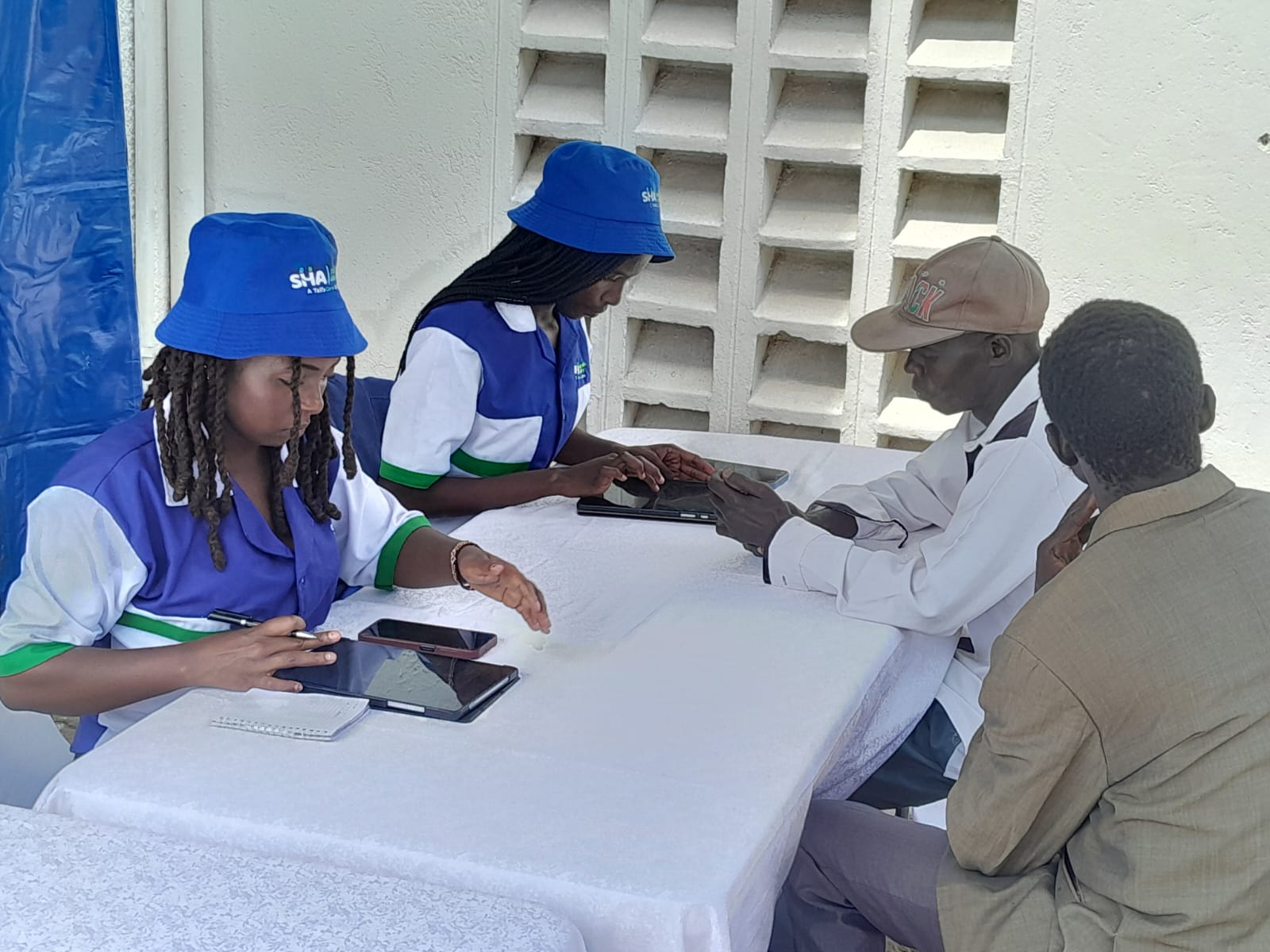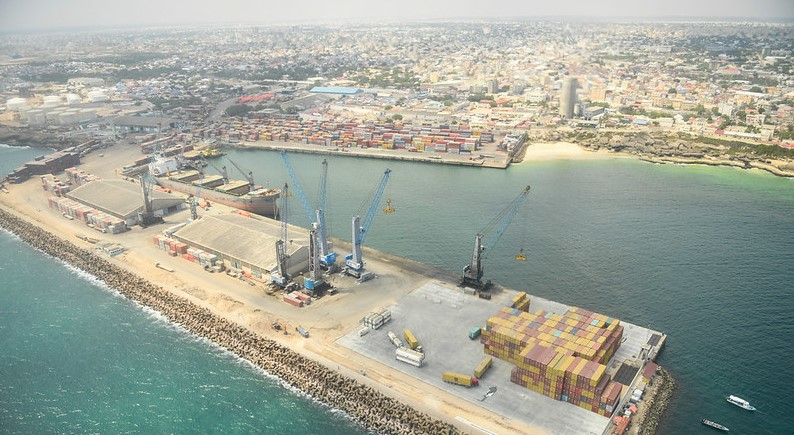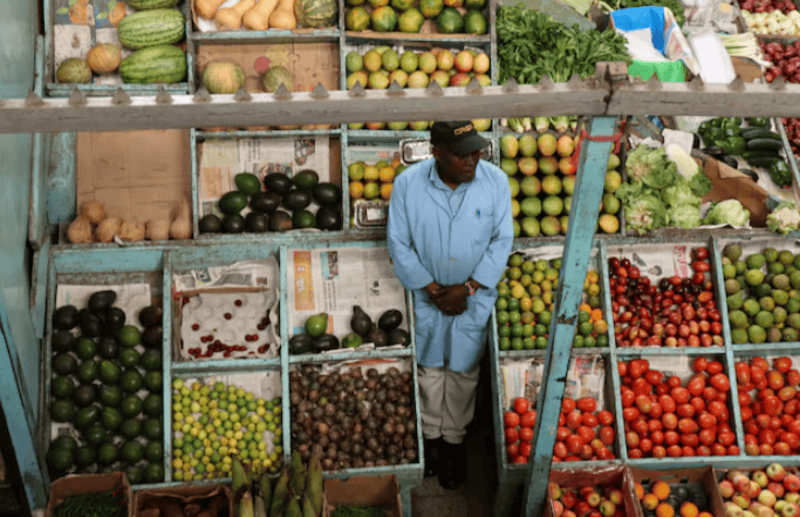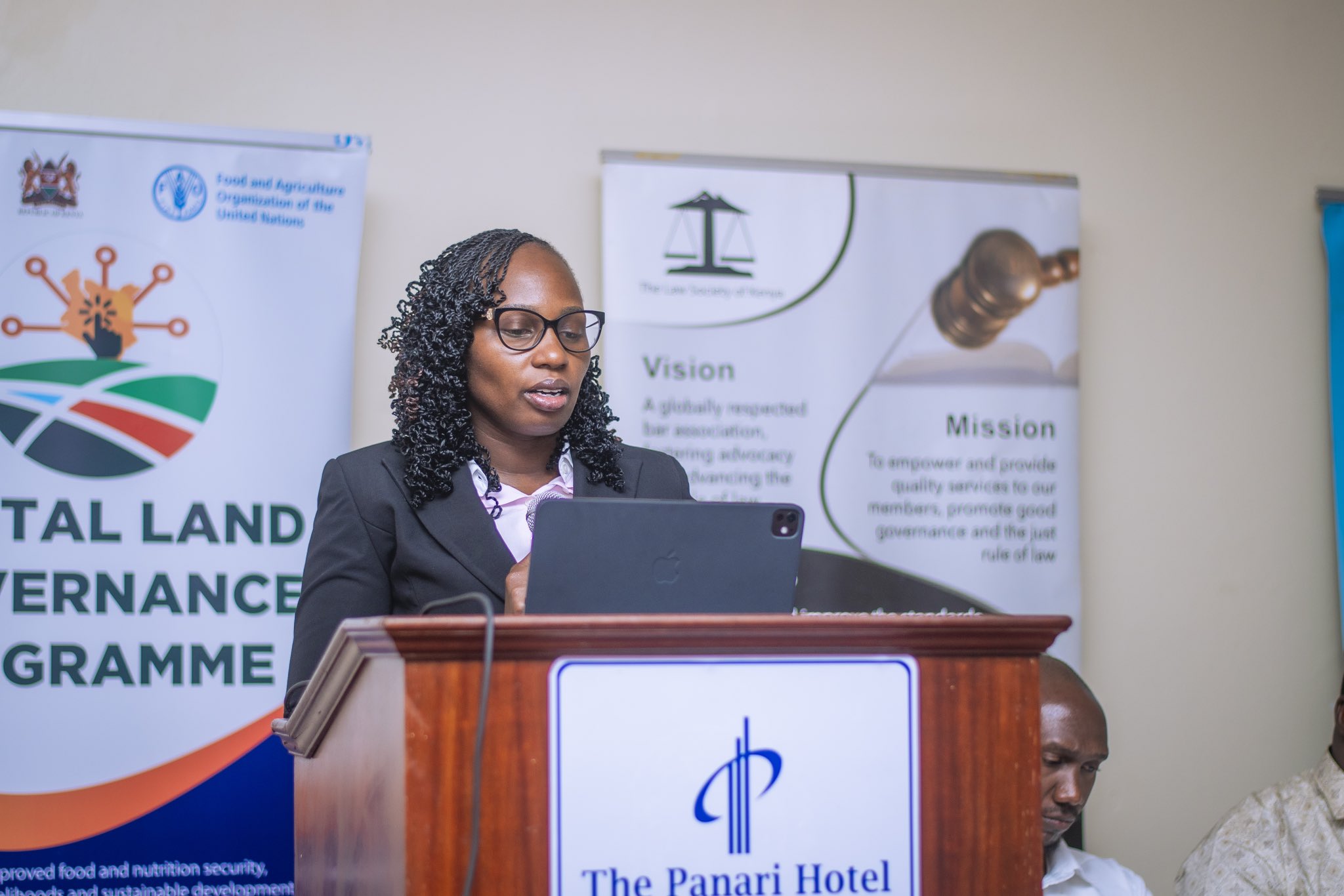Floods leave hundreds of Garissa farmers struggling to survive
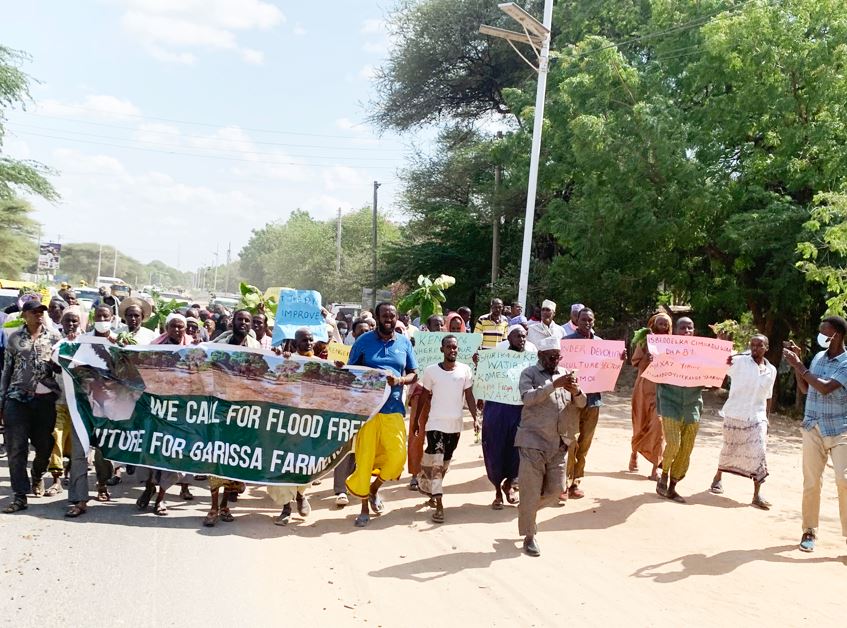
The affected farmers in Sankuri faulted the overflow of the Seven Fork Dams for their loss and urged the government to compensate them for the lost acreage.
More than 100 farmers in the Sankuri sub-county have been left reeling following the recent catastrophic floods from the River Tana that wiped out their entire farmlands. The disaster caused severe riverbank erosion, significantly impacting the livelihoods of farmers in Sankuri, Bara, Golotley, and Dalolo, leaving many struggling to recover from the devastating loss.
Somane Arale Gedi, a farmer at Sankuri Farm, is one among the farmers whose acres of land have been eroded by the River Tana.
More To Read
- Garissa farmers to benefit from Sh45 million irrigation project aimed at boosting food security
- Garissa farmers count losses as recurring floods wipe out solar-powered farming dreams
- Garissa, Tana River residents urged to evacuate as Masinga dam exceeds capacity
- Garissa farmers turn to beekeeping as a climate-resilient livelihood
- SUPKEM calls for empowerment of Garissa farmers to combat poverty, promote peace
- Garissa farmers affected by floods receive over 2,000 Pixie Orange seedlings
“Our parents started farming here in the early eighties when this river was 600 meters away. In between our farm and the river existed several acres of farmland that belonged to some other members of the Sankuri farmers group, all is no more and is now part of the free-flowing river,” said Somane.
Somane inherited the farm from his late father, who had planted several fruit trees, which he claimed were carried away. “Proceeds from our lost farm were used to pay school fees and I have been relying on it to sustain the family and educate my children, now it's history,” he lamented.
He appealed to the government and non-governmental organisations to come and help them continue farming because they have bushy land originally intended for livestock dry season grazing.
Ali Olow, a father of ten and a member of the Sankuri farm, was also counting his losses after losing his land to the river. He said he never thought that their farmland would one day turn into a river.
"Now that this river swallowed our farms, I'm still worried over the trajectory, this river was taking, it will next time swallow several villages in Sankuri if riverbank protection is not put in place urgently," Ali said.
Abdi Hussein from Bara farm told The Eastleigh Voice how he invested in the farm planting bananas, mangoes and lemon trees for the last three decades. “We don't know what to do next, our fate is with God who will give us an alternative livelihood,” he said.
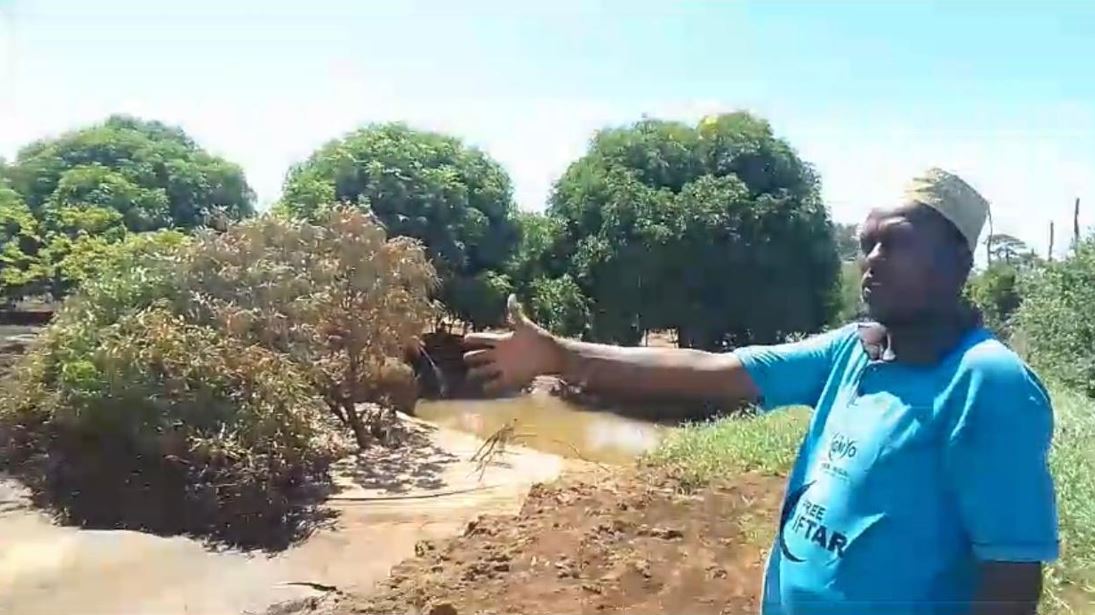 Somane Arale Gedi from Sankuri whose farm was affected by riverbed erosion. (Photo: Issa Hussein)
Somane Arale Gedi from Sankuri whose farm was affected by riverbed erosion. (Photo: Issa Hussein)
The affected farmers in Sankuri faulted the overflow of the Seven Fork Dams for their loss and urged the government to compensate them for the lost acreage.
Abdirahman Aden, the Sankuri location chief, claims that the river posed a great threat to the local community.
He said that many residents of Sankuri town and the adjoining Dalolo village in the Sankuri subcounty were concerned about the extent of riverbank damage caused by the recent River Tana flood caused by upstream April-May rainfall.
“In the neighbouring Dalolo sub-location, the current position of the river was a stark warning of an impending disaster. The road that links Dalolo to nearby Balich village is now the middle of the river, and people have been forced to use an alternative route. Several electricity poles were also swept away,” he said.
Abdikadir Aden of the One Million Tree organisation also recently raised alarm during a national tree planting day in Garissa town where he addressed the North Eastern administration that residents of Sankuri Ward were facing an imminent threat of riverbank erosion that needs urgent intervention.
Abdi Muhumed, a community elder in Dalolo also shared the same concerns.
“We settled here after we lost our livestock to a cycle of drought. The river was eating its edges and it is just 50 metres away from the village, we don't know what will happen next,” the elder said.
He stated that the locals had invested in the area, which included a fully operational primary school and dispensary, and were torn between migrating and establishing a new settlement somewhere.
Abdi hopes that the government will come up with a riverbank protection programme with the help of environmental experts to avert the impending threat.
El Nino River floods followed by April-May rainfall caused death, displacement, and destruction in Garissa County.
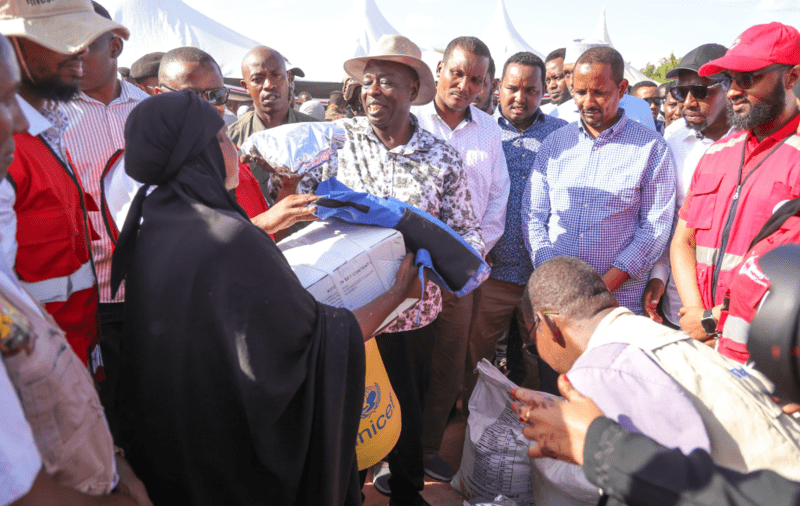 Deputy President Rigathi Gachagua distributing food to families affected by floods in Garissa County. (Photo: DPCS)
Deputy President Rigathi Gachagua distributing food to families affected by floods in Garissa County. (Photo: DPCS)Deputy President Rigathi Gachagua distributing food to families affected by floods in Garissa County on
More than 7500 farmers in Garissa were estimating Sh2.3 billion in losses after their crops, farm implements, and infrastructure, such as roads and canals, were destroyed. Hundreds of devastated Garissa County farmers took to the streets two weeks ago, demanding assistance from the national and local administrations.
Led by officials of the Garissa Farmers Network Association, the farmers assembled at the Garissa Primary School playground before a peaceful procession to the offices of the Garissa County Commissioner, the North Eastern Regional Commissioner, and the governor.
They marched to the offices, waving placards and sticks and screaming "No farmers, no food, no life," to submit their issues about losses caused by heavy rains and floods and complain about the lack of support.
In a memorandum given to officials, the farmers wanted flood control measures, afforestation projects, compensation, material and financial assistance, and agricultural investment.
Other demands included forming an independent farmers market, a regulatory framework to oversee produce from neighbouring counties, a local catastrophe warning system, and early resource mobilisation in preparation for floods.
Garissa Farmers Network chairman Abdi Farah highlighted a scenario in which a single farmer lost more than 10,000 banana trees due to flooding.
He said the farmers were not in a position to start farming due to the losses they incurred unless they were offered the necessary support as enlisted in the memorandum.
"We need farm implements, seeds and seedlings, finance for the farm labour and restoration of the lost infrastructure,” he said.
Hussein Said Warsame, a farmer who spoke during the demonstration stated they would keep protesting until their demands were met.
Deputy President Rigathi Gachagua, who visited Garissa town last month to assess the impact of the floods, promised the farmers that KenGen would compensate them by providing new water pump engines for irrigation.
Top Stories Today
